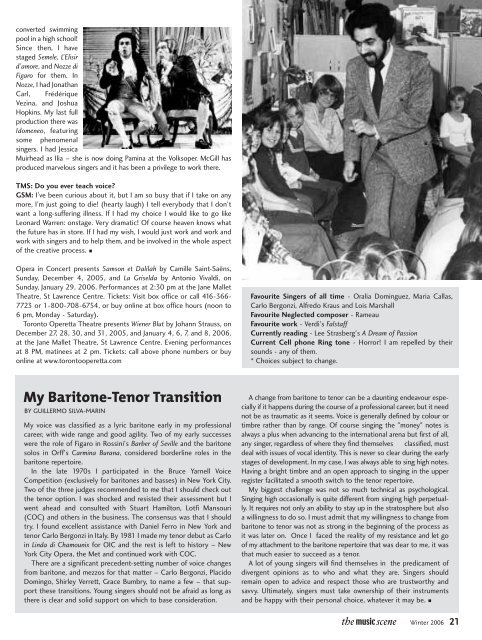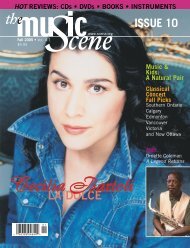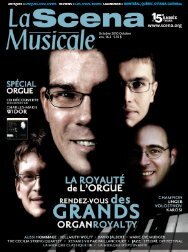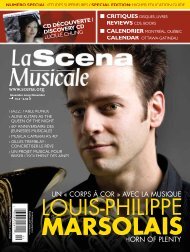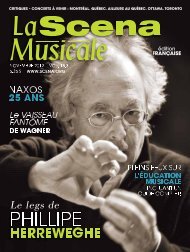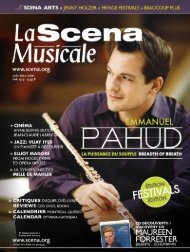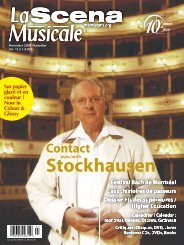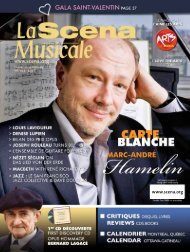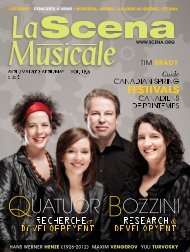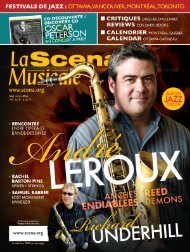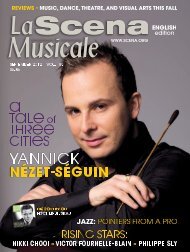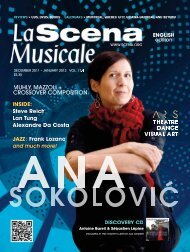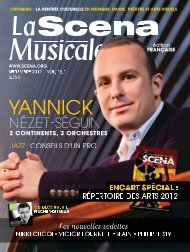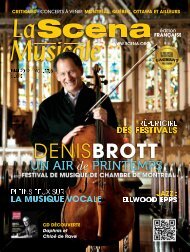Classical Music - La Scena Musicale
Classical Music - La Scena Musicale
Classical Music - La Scena Musicale
Create successful ePaper yourself
Turn your PDF publications into a flip-book with our unique Google optimized e-Paper software.
converted swimming<br />
pool in a high school!<br />
Since then, I have<br />
staged Semele, L’Elisir<br />
d’amore, and Nozze di<br />
Figaro for them. In<br />
Nozze, I had Jonathan<br />
Carl, Frédérique<br />
Vezina, and Joshua<br />
Hopkins. My last full<br />
production there was<br />
Idomeneo, featuring<br />
some phenomenal<br />
singers. I had Jessica<br />
Muirhead as Ilia – she is now doing Pamina at the Volksoper. McGill has<br />
produced marvelous singers and it has been a privilege to work there.<br />
TMS: Do you ever teach voice?<br />
GSM: I’ve been curious about it, but I am so busy that if I take on any<br />
more, I’m just going to die! (hearty laugh) I tell everybody that I don’t<br />
want a long-suffering illness. If I had my choice I would like to go like<br />
Leonard Warren: onstage. Very dramatic! Of course heaven knows what<br />
the future has in store. If I had my wish, I would just work and work and<br />
work with singers and to help them, and be involved in the whole aspect<br />
of the creative process. <br />
Opera in Concert presents Samson et Dalilah by Camille Saint-Saëns,<br />
Sunday, December 4, 2005, and <strong>La</strong> Griselda by Antonio Vivaldi, on<br />
Sunday, January 29, 2006. Performances at 2:30 pm at the Jane Mallet<br />
Theatre, St <strong>La</strong>wrence Centre. Tickets: Visit box office or call 416-366-<br />
7723 or 1-800-708-6754, or buy online at box office hours (noon to<br />
6 pm, Monday - Saturday).<br />
Toronto Operetta Theatre presents Wiener Blut by Johann Strauss, on<br />
December 27, 28, 30, and 31, 2005, and January 4, 6, 7, and 8, 2006,<br />
at the Jane Mallet Theatre, St <strong>La</strong>wrence Centre. Evening performances<br />
at 8 PM, matinees at 2 pm. Tickets: call above phone numbers or buy<br />
online at www.torontooperetta.com<br />
Favourite Singers of all time - Oralia Dominguez, Maria Callas,<br />
Carlo Bergonzi, Alfredo Kraus and Lois Marshall<br />
Favourite Neglected composer - Rameau<br />
Favourite work - Verdi's Falstaff<br />
Currently reading - Lee Strasberg's A Dream of Passion<br />
Current Cell phone Ring tone - Horror! I am repelled by their<br />
sounds - any of them.<br />
* Choices subject to change.<br />
My Baritone-Tenor Transition<br />
BY GUILLERMO SILVA-MARIN<br />
My voice was classified as a lyric baritone early in my professional<br />
career, with wide range and good agility. Two of my early successes<br />
were the role of Figaro in Rossini's Barber of Seville and the baritone<br />
solos in Orff's Carmina Burana, considered borderline roles in the<br />
baritone repertoire.<br />
In the late 1970s I participated in the Bruce Yarnell Voice<br />
Competition (exclusively for baritones and basses) in New York City.<br />
Two of the three judges recommended to me that I should check out<br />
the tenor option. I was shocked and resisted their assessment but I<br />
went ahead and consulted with Stuart Hamilton, Lotfi Mansouri<br />
(COC) and others in the business. The consensus was that I should<br />
try. I found excellent assistance with Daniel Ferro in New York and<br />
tenor Carlo Bergonzi in Italy. By 1981 I made my tenor debut as Carlo<br />
in Linda di Chamounix for OIC and the rest is left to history – New<br />
York City Opera, the Met and continued work with COC.<br />
There are a significant precedent-setting number of voice changes<br />
from baritone, and mezzos for that matter – Carlo Bergonzi, Placido<br />
Domingo, Shirley Verrett, Grace Bumbry, to name a few – that support<br />
these transitions. Young singers should not be afraid as long as<br />
there is clear and solid support on which to base consideration.<br />
A change from baritone to tenor can be a daunting endeavour especially<br />
if it happens during the course of a professional career, but it need<br />
not be as traumatic as it seems. Voice is generally defined by colour or<br />
timbre rather than by range. Of course singing the "money" notes is<br />
always a plus when advancing to the international arena but first of all,<br />
any singer, regardless of where they find themselves classified, must<br />
deal with issues of vocal identity. This is never so clear during the early<br />
stages of development. In my case, I was always able to sing high notes.<br />
Having a bright timbre and an open approach to singing in the upper<br />
register facilitated a smooth switch to the tenor repertoire.<br />
My biggest challenge was not so much technical as psychological.<br />
Singing high occasionally is quite different from singing high perpetually.<br />
It requires not only an ability to stay up in the stratosphere but also<br />
a willingness to do so. I must admit that my willingness to change from<br />
baritone to tenor was not as strong in the beginning of the process as<br />
it was later on. Once I faced the reality of my resistance and let go<br />
of my attachment to the baritone repertoire that was dear to me, it was<br />
that much easier to succeed as a tenor.<br />
A lot of young singers will find themselves in the predicament of<br />
divergent opinions as to who and what they are. Singers should<br />
remain open to advice and respect those who are trustworthy and<br />
savvy. Ultimately, singers must take ownership of their instruments<br />
and be happy with their personal choice, whatever it may be. <br />
music scene Winter 2006 21


